Debt collection agencies: Key concepts and legal frameworks

Dealing with debts can be a complex and challenging aspect of financial transactions due to many factors that come into play.
Financial agreements have an intricate nature and varying terms and conditions associated with different types of loans or credit. This makes it difficult for individuals to keep track of their repayment obligations.
Additionally, unexpected life events such as medical emergencies, job loss, or economic downturns can disrupt one’s ability to meet financial commitments. This leads to a struggle in debt management.
This is where the importance of debt collection agencies becomes evident. These agencies serve as intermediaries, equipped with the expertise to navigate the complexities of debt recovery.
Debt collection agencies: Key concepts
Debt collection agencies alleviate the burden on creditors who may lack the resources or expertise to recover debts effectively. They also provide debtors with a channel for communication and negotiation.
Understanding the key concepts associated with debt collection agencies is crucial for creditors and debtors to navigate the debt recovery process effectively.

Debt collection agency role
Debt collection agencies play an essential role in maintaining the overall health of the financial ecosystem.
Debt collection agencies’ involvement in financial-related transactions brings professionalism to the process. These agencies help balance the responsibilities and rights of creditors and debtors.
Creditor and debtor
Debt collection agencies work on behalf of creditors to collect outstanding debts from debtors.
A creditor is an institution, a business, or an individual that lends finances or extends credit to another party. A debtor, on the other hand, is the party that owes money to the creditor.
Debt validation
Debt validation is a crucial consumer protection concept that ensures debt accuracy. This process involves the agency providing evidence that the debt is accurate and valid.
When a debt collection agency contacts a debtor about an outstanding debt, the debtor has the right to request validation of the debt.
Debt validation helps prevent situations where individuals are pursued for debts they do not owe. It also offers transparency and fairness in the debt collection process.
Credit impact
Debt collection can significantly impact an individual’s credit score. When debts are not repaid on time, creditors may report these delinquent accounts to credit bureaus.
These negative marks can lower a person’s credit score, making it harder to secure favorable interest rates or obtain credit in the future.
Debt collection agencies often work with debtors to develop repayment plans that can help mitigate the negative credit impact of outstanding debts.
Importance of debt collection in financial transactions
The role of debt collection agencies extends beyond the immediate recovery of funds. It plays a crucial part in maintaining the stability of financial transactions.
Unrecovered debts can lead to financial instability for creditors, impacting their ability to lend or invest in the future. By recovering outstanding debts, debt collection agencies contribute to the flow of funds within the economy.
Moreover, efficient debt collection practices contribute to a healthier credit ecosystem, ensuring that those who lend money can continue to do so with confidence.

Common debts handled by debt collection agencies
Debt collection agencies handle a wide range of debts on behalf of creditors. Some of the most common types of debts they manage include:
Medical bills
Medical bills often surge unexpectedly due to unforeseen health emergencies or necessary treatments.
In such instances, the resulting financial burden can become overwhelming. Debt collection agencies collaborate with healthcare providers to reclaim outstanding medical debts.
They approach debtors with empathy, offering flexible repayment alternatives tailored to the debtor’s financial circumstances. This facilitates debt recovery and acknowledges the sensitive nature of medical debts.
Credit card debts
Among the most prevalent forms of consumer debt are credit card debts. When credit card holders miss timely payments, accumulating balances are subject to high-interest rates. This complicates the repayment process.
Debt collection agencies specialize in regaining control over these delinquent debts. Often, they negotiate with debtors to formulate feasible repayment strategies. They also assist individuals in managing their credit card obligations.
Utility bills
Unsettled utility bills, including utilities like electricity, water, or gas, can swiftly lead to debt collection actions.
Debt collection agencies collaborate with utility providers to retrieve these outstanding payments promptly. Their involvement ensures that individuals maintain access to vital utilities while addressing their financial commitments.
Personal loans
Personal loans include various borrowing arrangements, such as unsecured and payday loans. In cases where borrowers default on these loans, debt collection agencies step in to facilitate recovery.
They offer diverse options for repayment tailored to debtors’ circumstances, helping individuals navigate the process of resolving these debts efficiently.
Negotiations and settlements are often employed to find mutually beneficial resolutions.
Debt collection agencies: Legal frameworks
The operations of debt collection agencies are closely regulated by legal frameworks designed to protect the rights of creditors and debtors.
Some key legal acts governing debt collection practices include:
Fair Debt Collection Practices Act (FDCPA)
The FDCPA is a federal law that outlines the rules debt collection agencies must follow when attempting to collect debts. This prohibits harassment, deception, and unfair treatment of debtors.
Under the FDCPA, debtors have the right to request debt validation and can opt to cease communication with debt collectors.

Consumer Financial Protection Bureau (CFPB)
The CFPB is a regulatory agency responsible for enforcing federal consumer protection laws, including those related to debt collection.
It monitors the practices of debt collection agencies to ensure compliance with the law and handles consumer complaints about unfair debt collection practices.
Fair Credit Reporting Act (FCRA)
The FCRA focuses on the accuracy and privacy of information in credit reports. FCRA has to ensure that individuals receive the right to dispute inaccurate information and have it corrected.
By understanding the key concepts surrounding debt collection agencies and the legal frameworks guiding their actions, creditors, and debtors can navigate the debt collection landscape with greater clarity and confidence.
Whether it’s medical bills, credit card debts, utility bills, or personal loans, these agencies play an essential role in shaping the financial landscape we all operate in.







 Independent
Independent




